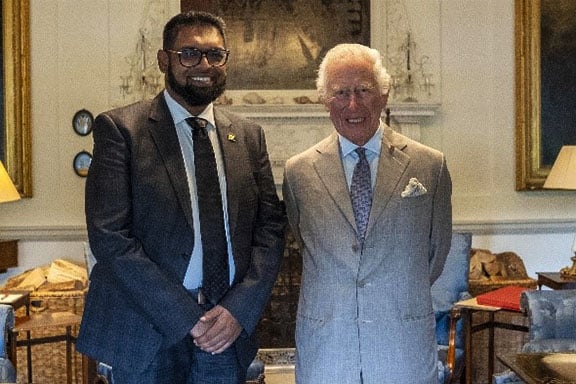The Office of the President yesterday announced that President Irfaan Ali had visited Scotland this past week to advance Guyana’s Low Carbon Development Strategy and took part in a series of high-level engagements facilitated by the King’s Foundation.
The King’s Foundation is a charity that was established by King Charles III while he was still Prince that focusses on creating communities where people, places and the planet co-exist in harmony.
The visit follows the King’s Foundation’s recent engagements in Guyana and the President’s announcement that the Foundation would support the next phase of the LCDS, with a particular focus on sustainable urban development. This announcement was made during the President’s speech on the LCDS last week, during which he set out how Georgetown could once more be the Garden City of the Caribbean.
According to the release, President Ali held a private, one-on-one meeting with King Charles III, where they discussed their shared commitment to climate resilience, sustainable development, agriculture, and community-driven initiatives supporting vulnerable populations.
“We spoke at length about our shared view for the world on the importance of cutting-edge sustainable development solutions. The King has been a long-term supporter of Guyana’s LCDS, which he has highlighted as a global example since it was launched in 2009. I am optimistic that we will work together as partners in the years ahead, especially with the new LCDS priorities—including sustainable urban development, biodiversity, and water management,” the President said following the meeting,
He added, “Before I came, I was aware of the admirable work of the King’s Foundation — but seeing it first-hand here in Scotland has been inspiring. I believe that there is a lot we can learn from each other, and that Guyana can be an example for the Commonwealth on our new priorities, just as we have been an example on forests for the past 15 years.”
President Ali also attended a private dinner with the King, where they continued their dialogue on fostering deeper collaboration. “I told His Majesty that I look forward to highlighting Guyana and the King’s Foundation’s work across the Commonwealth, including when we meet next at CHOGM (Common-wealth Heads of Government Meeting) in a few weeks’ time.”
As part of his itinerary, Guyana’s Head of State toured several facilities that provide critical support to local and vulnerable populations across Scotland, including programmes for unemployed youth, students, and individuals facing health challenges. His engagements focussed on areas of education, innovation, and sustainability, reflecting Guyana’s commitment to an inclusive and low-carbon future. These included visits to the following:
STEM workshops – where he was updated on cutting-edge educational programs aimed at empowering young people in science, technology, engineering, and mathematics (STEM) fields.
The Regenerative Agriculture Centre – which offered facilities dedicated to regenerative agricultural practices, designed to enhance soil health, increase biodiversity, and offer sustainable food solutions. This aligns with Guyana’s own goals of becoming a regional leader in agriculture and food security.
Housing initiatives projects – designed to provide high-quality, sustainable homes, while focusing on building the skills needed for modern homes, reducing energy consumption, and promoting green building practices, aligning with Guyana’s goals of creating environmentally friendly, inclusive housing developments.
Green space urban planning projects – these focus on urban regeneration and the creation of green spaces, which contribute to improved well-being for local communities. Here, Ali expressed keen interest in replicating similar initiatives in Guyana as part of his government’s focus on urban renewal and eco-friendly urban design.
Textiles workshops – This visit allowed the President to engage with artisans supporting local economic development, and observe how traditional skills are being preserved while incorporating sustainable practices. The workshops highlighted the importance of community-driven enterprises that empower marginalised groups, including women and youth.










